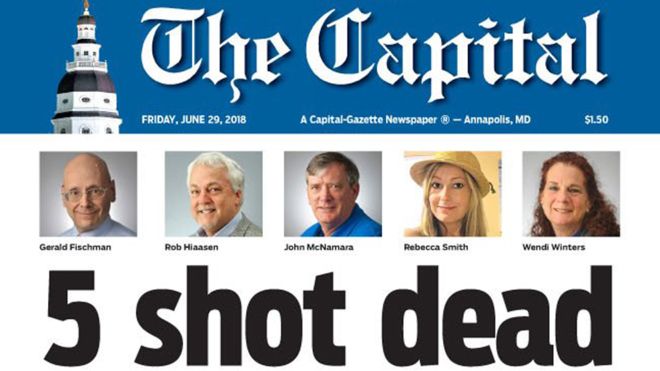Pulitzer Prizes shed light on wounded newsrooms, both literal and metaphorical
Fitting into a broader industry pattern, in January of this year, 1000 jobs were cut in newsrooms across the country. The Pulitzer Prizes reinforce why that is a dangerous trend.
April 22, 2019
In Annapolis, Md., June 28, five journalists at the Capital Gazette newspaper were murdered by a disillusioned man who had his questionable conduct scrutinized by the paper. They wrote a story detailing his history of harassing women and—as a result—he attempted to kill “everyone present” at the newspaper’s offices, the Baltimore Sun reported. He walked into the newspaper’s office and opened fire.
He didn’t kill everyone, but what he did do was strip the Annapolis community of five exemplary journalists. They were killed because they as an institution were doing their job, telling stories of the transgressions in their community, and in doing that they upset the wrong man.
But despite their hurt—despite the sorrow and trauma that comes from seeing five of their colleagues murdered, right in front of their eyes—early the next day, an issue of the Capital Gazette was being delivered to people’s homes, placed on local newsstands and delivered the news of the murder of five of their own to their own community.
Despite their tragedy, their presses could not be stopped.
On April 15 in New York, at the Pulitzer Prize ceremony at the Columbia University school of journalism, the staff of the Capital Gazette received a special citation for what the Pulitzers called “their courageous response to the largest killing of journalists in U.S. history.”
They noted that their work demonstrated their “unflagging commitment to covering the news and serving their community at a time of unspeakable grief.” As part of the citation, the Pulitzers provided the staff $100,000 to help continue their ability to cover their community, in a time when the state of the local press is less than ideal.
When looking through this year’s Pulitzer Prize winners, it is incredible to see the stories that are often forgotten throughout the hectic news cycle and see the exemplary work that can so easily fly under the radar during the year of news consumption.
When the Prizes come out, a necessary light is shined on the work of journalistic institutions big and small, but it also reminds us of the importance of the courageous local journalists who labour tirelessly every day to ensure our communities receive the necessary attention they deserve.
If you follow the news even a little bit, you likely know that the New York Times, The Washington Post and the Wall Street Journal are all doing excellent work. That’s hard to deny.
But you may not necessarily know about the incredible local reporting by the Baton Rouge Advocate about the Louisiana laws that—unlike literally all other states—do not require that all 12 jurors in a criminal proceeding to agree on a guilty verdict, a vestige of the Jim Crow south.
You probably do not know about the University of Southern California doctor who abused innumerable college students as a gynecologist at the student health center on campus. After the LA Times published these accusations and uncovered the countless signs of misconduct that the school failed to respond to, a flood of further accusations followed.
These are local journalists covering stories that matter to their community, often in a very financially precarious position. Oftentimes, their newsrooms are emptying, with newspaper owners attempting to bolster their bottom line by cutting staff left and right. That hurts the news.
Despite those threats to the strength of community journalism, when tragedy strikes a community—like it did in Annapolis—the local news responds in force. In the Pulitzer announcements, that fact shines clear as day.
Take the Florida Sun Sentinel, for instance, who won the Public Service Pulitzer, the most prestigious Pulitzer Prize, for their coverage of the Marjory Stoneman Douglas High School, the tragic school shooting that shook the very core of high school life.
The Sun Sentinel was lauded for by the award committee for “exposing failings by school and law enforcement officials before and after the deadly shooting rampage at Marjory Stoneman Douglas High School.”
This quality reporting is at risk of being lost as a result of the drastic cost cutting measures by newspaper owners that inhibits journalists’ ability to gather this high-value information. People have come to believe that, with so much information at their disposable, that information is free.
They ask—I even once asked—“Why should I pay for news when I can easily get it for free?” But without supporting your local journalists, we as a community are complicit in the erosion of this reporting that changes lives and changes our world.
Without money, journalists have to do more with less, which poses an existential threat to the investigative reporting that makes our government and our communities better.
Without money, news organizations will have a harder time being able to afford to do the exemplary reporting that the Pulitzer Prizes are designed to recognize.
Without money, we will be living in communities whose problems become more entrenched, we will be living in communities where corrupt politicians are able to run scotch-free, and we will be living in communities whose stories are not preserved for future generation.
I am not saying you have to subscribe to a physical print newspaper, but the news organizations who win Pulitzer Prizes tend to not just give their work away: they, after reading a certain number of stories on their websites, make you pay to continue to read their work. Without that, they can’t do this high-quality public service journalism.
If you want to subscribe to the physical newspaper, great, go ahead! But subscribe to a newspaper’s digital content, because they have to pay journalists to go out and do the hard work of gathering accurate and valuable information and turning that into an article that helps you live your life.
Don’t think that information is free. If we as a society accept this idea that information and news is free, we will need to say our good riddance to valuable, public service journalism. As a society, we can’t allow that to happen.
Support local news. Our society and our children depend on it. Every year, the Pulitzers remind us of this fact.



















![Movie poster for '[Rec]" (2007).](https://www.lionnewspaper.com/wp-content/uploads/2023/04/rec-640x900.jpg)




Gretchen Kulat • Apr 23, 2019 at 3:08 pm
What an incredible article highlighting the bravery and importance of the profession. Bravo, Lars!